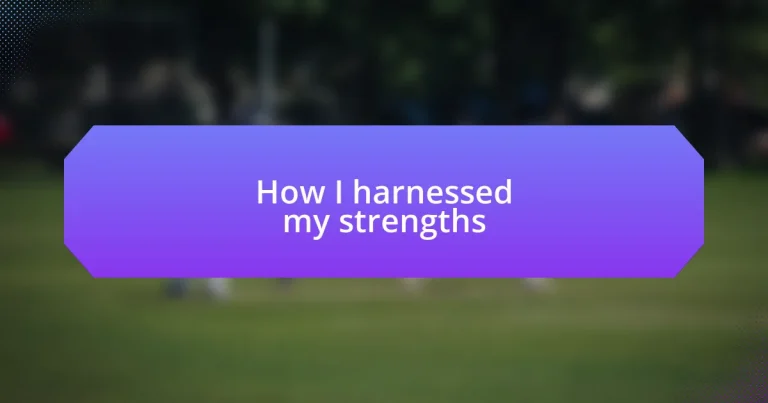Key takeaways:
- Self-discovery of unique strengths can emerge through experiences like leading team projects and overcoming challenges.
- Identifying strengths involves recognizing moments of flow, receiving positive feedback, and reflecting on energizing tasks.
- Creating a growth plan with measurable goals and seeking feedback is essential for personal development.
- Sharing strengths with others, whether through mentorship or collaborative efforts, enhances team dynamics and fosters innovation.
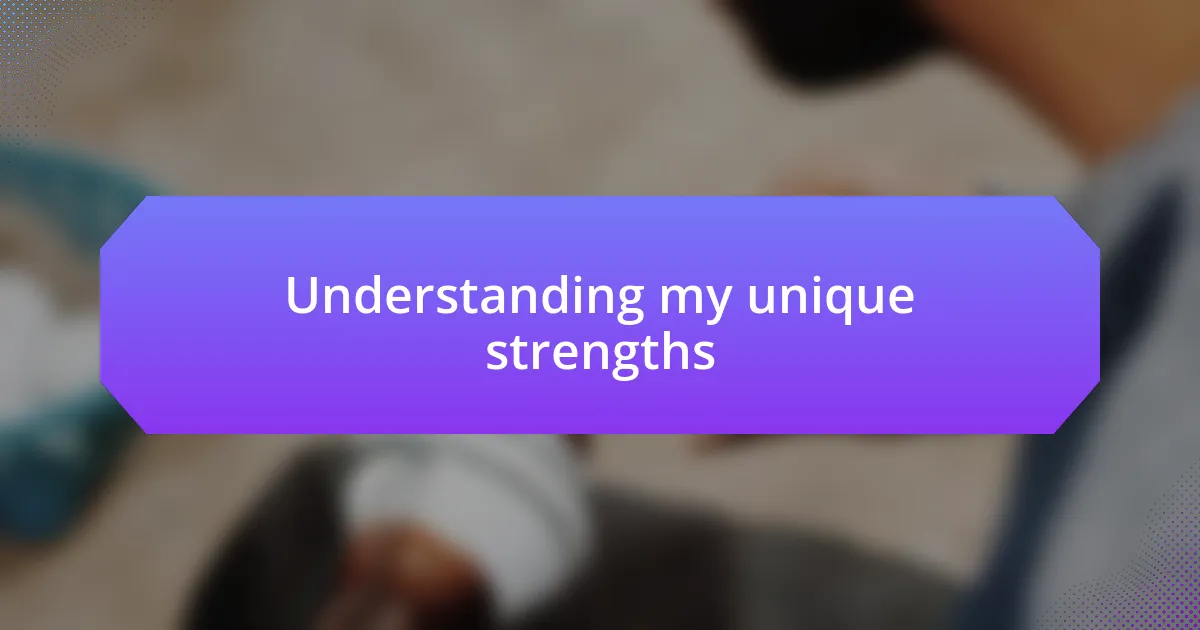
Understanding my unique strengths
Understanding my unique strengths has been a journey of self-discovery. I remember a time when I faced a challenging team project at work. I naturally took the lead, organizing everyone’s strengths, which not only made the project flow smoothly but also revealed my ability to connect with diverse personalities effectively. Have you ever experienced a moment when your instincts guided you toward a role you didn’t know you could excel in?
Reflecting on my past experiences, I found that my knack for creative problem-solving often emerges when unexpected obstacles arise. For instance, during a particularly hectic period in my career, I devised an innovative solution to streamline our workflow, saving countless hours for my team. This taught me that my strength lies not just in creativity but in being resourceful under pressure. Isn’t it fascinating how our adversity often uncovers our hidden talents?
It’s essential to delve deep into my passions, as they often highlight my unique strengths. I’ve discovered that my enthusiasm for communication enhances my ability to connect with others meaningfully. After participating in a public speaking workshop, I realized how profoundly my ability to articulate thoughts could inspire others. Have you considered how your interests might intertwine with your strengths? This connection can be incredibly revealing.
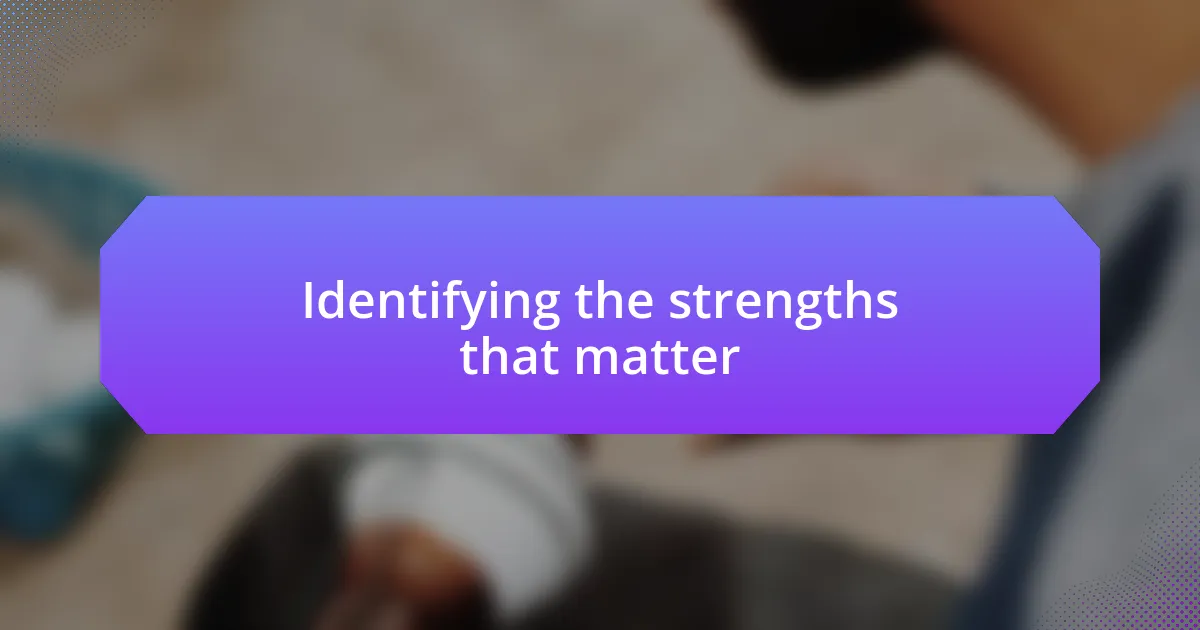
Identifying the strengths that matter
Identifying the strengths that truly matter can feel like navigating a maze. I recall an instance in my early career where I struggled to communicate my ideas clearly during a meeting. Frustrated, I turned to a mentor who suggested I focus on my empathetic nature. By consciously practicing active listening, I began to realize how this strength allowed me to connect deeply with colleagues and clients alike. It highlighted the importance of recognizing not just what I do well but also how these strengths impact others.
To help pinpoint strengths that resonate, consider the following:
- Moments of Flow: Identify activities where time slips by effortlessly; these often align with your strengths.
- Positive Feedback: Reflect on compliments or praise from others; it can shine a light on strengths you might overlook.
- Challenges Overcome: Think about obstacles you’ve successfully navigated; the skills you leveraged during these times can reveal core strengths.
- What Energizes You: Pay attention to tasks that invigorate you; passion is often a clue to your inherent strengths.
Recognizing what truly matters will shape not only personal growth but also how I can contribute meaningfully to my team and organization.
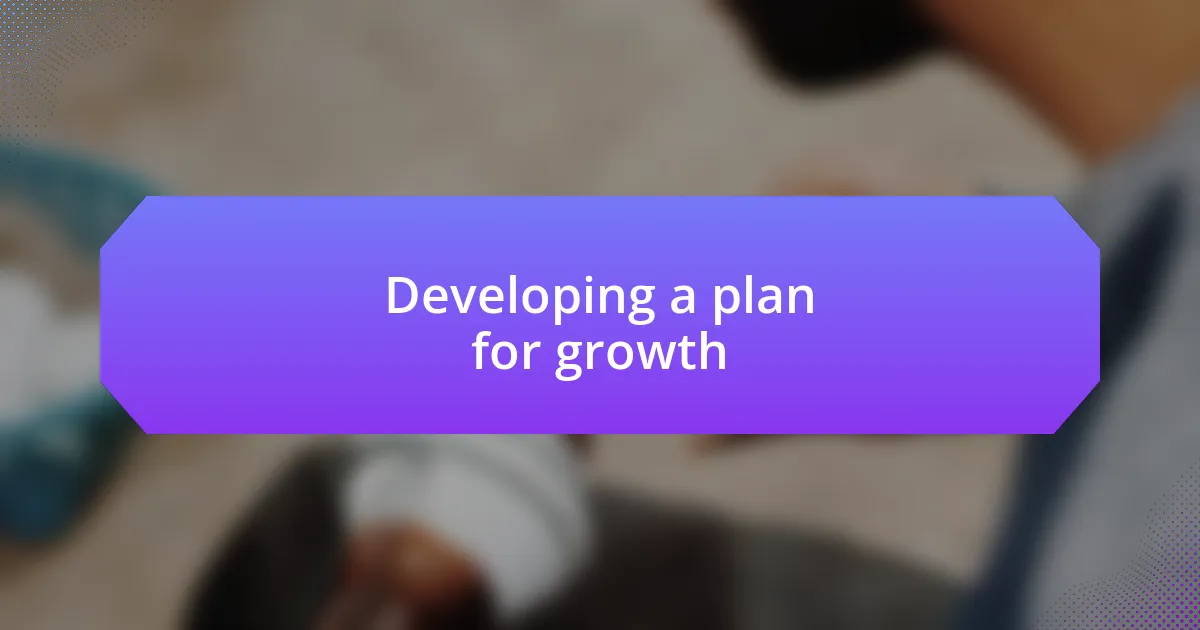
Developing a plan for growth
Developing a plan for growth requires intentionality and a clear roadmap. I remember when I set my sights on public speaking. I realized that while I had the content, I needed to enhance my delivery. Crafting a detailed plan involved not just practicing my speeches but also seeking feedback from trusted colleagues. This collaborative approach provided me with insights that accelerated my growth in a way that solitary practice never could.
Next, I established measurable goals to track my progress. For instance, I committed to attending local Toastmasters meetings, which pushed me out of my comfort zone. Each meeting became a stepping stone. I could see my confidence build as I faced different speaking challenges. Setting concrete milestones kept me motivated, and celebrating small victories along the way, like successfully conveying a complex idea without stumbling, made the journey enjoyable.
Lastly, I consistently revisited and adjusted my plan. For example, after a presentation that didn’t go as well as I hoped, I reflected on what went wrong and sought advice. I learned that flexibility in my approach was crucial. Adapting my strategy enabled me to harness my strengths more effectively, ensuring my growth journey remained dynamic and responsive to my evolving needs.
| Strategy | Example |
|---|---|
| Establish Goals | Join Toastmasters to practice public speaking |
| Seek Feedback | Request input from colleagues after presentations |
| Adjust Plan | Revise strategies based on experiences and reflections |
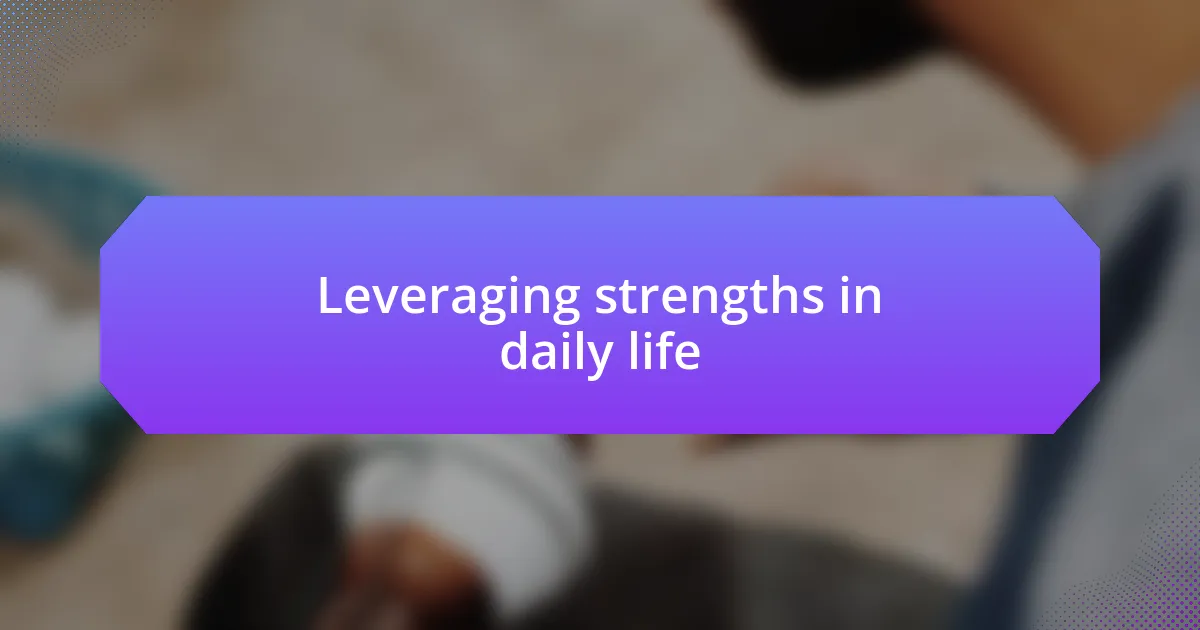
Leveraging strengths in daily life
Drawing on my strengths in daily life has significantly transformed my interactions and decision-making. For instance, I’ve always excelled in listening, which I realized could enhance my relationships both personally and professionally. Whenever a friend shares a problem, I strive to fully engage and empathize, which not only strengthens our bond but also allows me to provide support that genuinely resonates. Have you ever noticed how a simple act of truly listening can change the dynamic of a conversation?
In my workplace, I leverage my analytical skills to tackle complex problems. When confronted with a challenging project, I break it down into manageable parts, which turns overwhelming tasks into achievable steps. This approach not only simplifies my workload but also boosts my confidence as I navigate through each segment. I remember when I faced a significant project deadline; my ability to analyze and prioritize was my anchor, guiding me and my team to success.
Additionally, I’ve found joy in embracing my creativity during brainstorming sessions. I contribute unique ideas that might seem unconventional at first but often spark valuable discussions. For example, when our team was struggling to innovate, I introduced a quirky metaphor that breathed life into our ideas. That moment taught me the importance of not shying away from my creative instincts. Isn’t it fascinating how leveraging our strengths can lead to breakthroughs in unexpected ways?
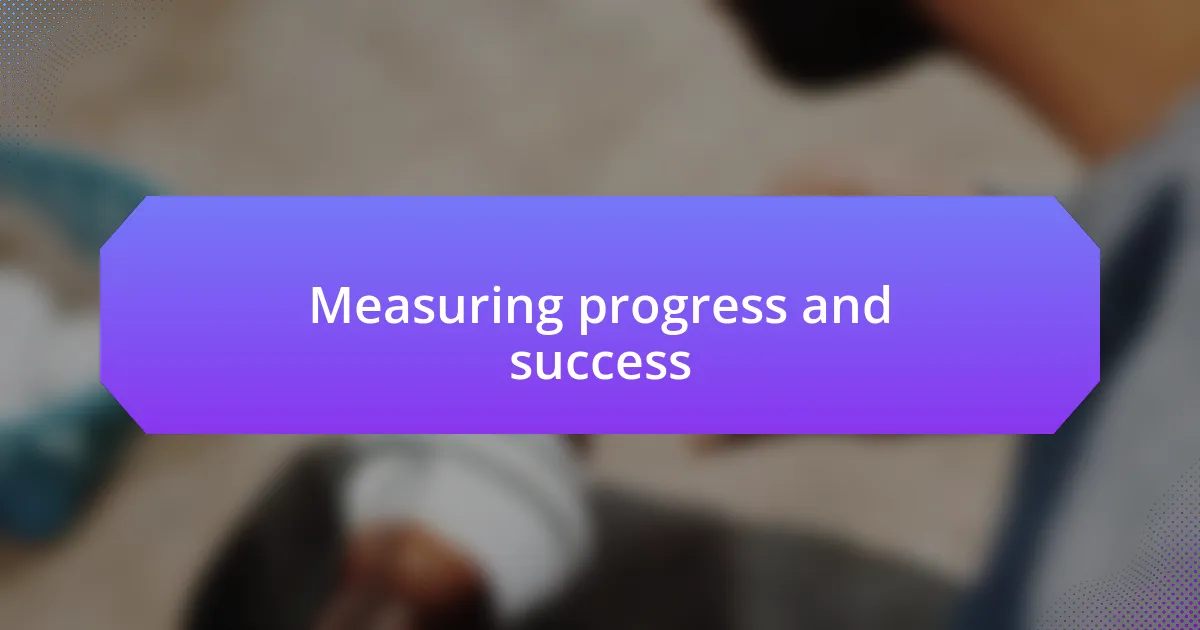
Measuring progress and success
Measuring progress and success is crucial to understanding how effectively I leverage my strengths. I remember when I decided to track my listening skills—counting the number of meaningful conversations I had each week. It was eye-opening to see how a simple log of these interactions not only encouraged me to engage more deeply but also provided concrete evidence of my growth in this area.
I also evaluate my success by reflecting on the outcomes of my analytical projects. After a significant project, I take time to assess not just the completion but also the results: Did my approach lead to a positive change? Did my team feel more empowered? This self-assessment helps me appreciate the journey, reinforcing that success isn’t merely about hitting targets but about making a lasting impact on those around me.
Moreover, I keep a journal of my creative contributions during team meetings. Looking back at these entries, I can track ideas that sparked enthusiasm or led to breakthroughs. This not only tracks my progress but also inspires me when I might feel less innovative. It begs the question: how often do we pause to celebrate the small successes that stem from our strengths? For me, those reflections transform the path of growth into a more tangible and gratifying experience.
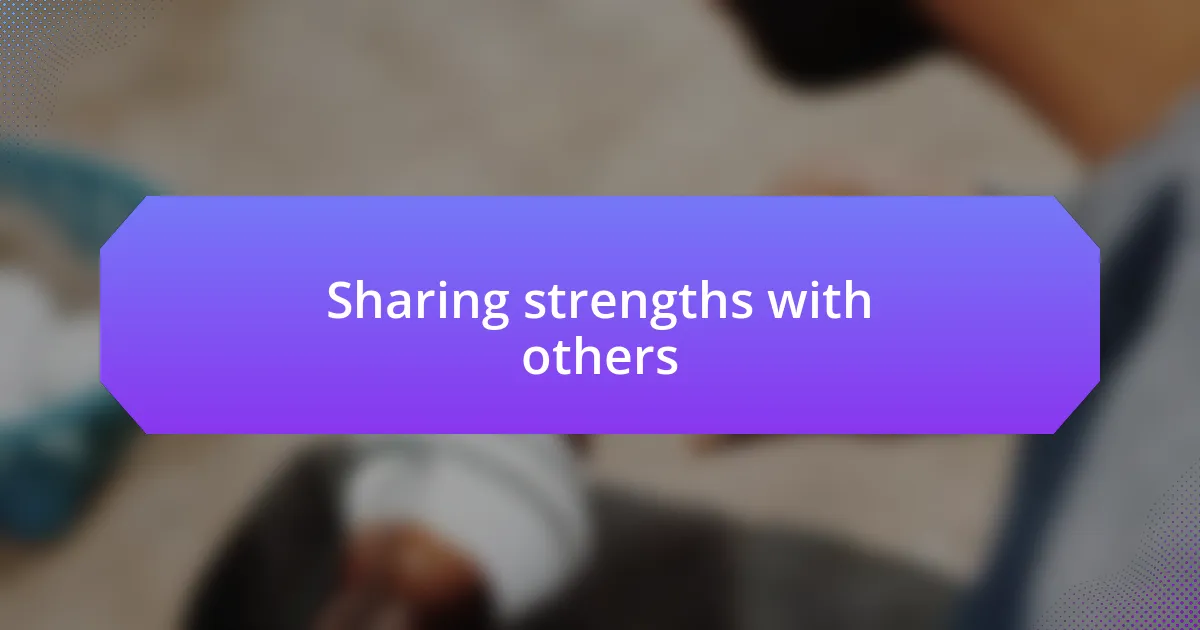
Sharing strengths with others
Sharing my strengths with others has always felt rewarding. For instance, when I realized my ability to communicate effectively, I started hosting informal workshops for my colleagues. Each session wasn’t just a way for me to share knowledge; it became a catalyst for collaboration and camaraderie, fostering a supportive environment where everyone felt empowered to express their ideas.
I also find immense joy in mentoring younger team members. I remember a particular instance when a mentee was struggling with public speaking. I shared my own experiences of overcoming anxiety in similar situations, which not only helped her but also built a deeper connection between us. Reflecting on those moments makes me wonder: how many individuals can benefit from a little guidance and the sharing of strengths?
Another aspect I’ve noticed is the impact of collective strengths. During team projects, I often encourage my colleagues to highlight their unique skills, creating a space where everyone feels valued. It’s fascinating to witness how combining our strengths leads to innovation and success. Could it be that sharing our strengths is just as important as developing them individually? I believe it truly fosters a sense of belonging and boosts overall team morale.












